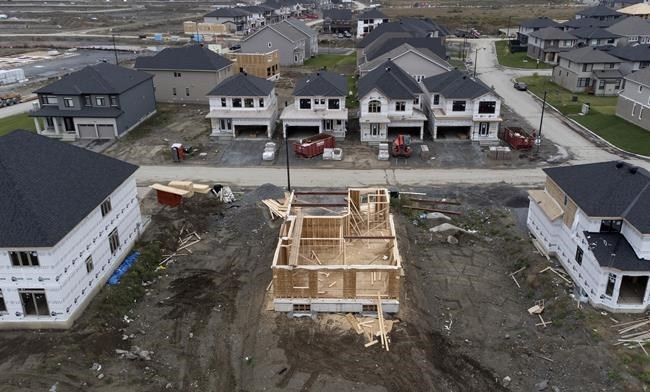OTTAWA — The annual pace of housing starts in Canada fell 22 per cent in November as work began on fewer multi-unit projects, Canada Mortgage and Housing Corp. said Friday.
The agency said the monthly seasonally adjusted annual rate of housing starts in November came in at 212,624 units, down from 272,264 in October.
The drop came as the annual pace of urban starts fell 23 per cent to 195,363 units, with the rate of multi-unit urban starts down 27 per cent at 151,297. Single-detached urban starts fell seven per cent to 44,066 units.
"The notable drop in the rate of housing starts in November, particularly in the multi-unit space, should not come as a major surprise and reflects tighter economic conditions impacting construction timelines," CMHC deputy chief economist Kevin Hughes said in statement.
"As the more difficult borrowing conditions and labour shortages now seem to be showing in the starts numbers, we can expect to see continued slower starts rates in the coming months."Â
The rate of starts in Montreal was down 30 per cent, while Toronto and Â鶹´«Ã½Ó³»both saw a drop of 39 per cent, driven by significantly lower multi-unit starts.
The annual pace of rural starts for November was an estimated 17,261.
The six-month moving average of the monthly seasonally adjusted annual rate of housing starts in November was 257,777, up 0.7 per cent from 255,876 in October.
TD Bank economist Rishi Sondhi said the data was consistent with the bank's view that housing starts will trend lower moving forward, as past weakness in home sales flow through to new supply.Â
"However, we're anticipating some bounceback took place in December, consistent with rising permit issuance in recent months," Sondhi wrote in a report on Friday.
He noted that government actions such as eliminating the GST on purpose-built rentals coupled with population growth will likely keep the level of starts elevated through 2024, even with the anticipated downtrend.
This report by The Canadian Press was first published Dec. 15, 2023.
The Canadian Press



